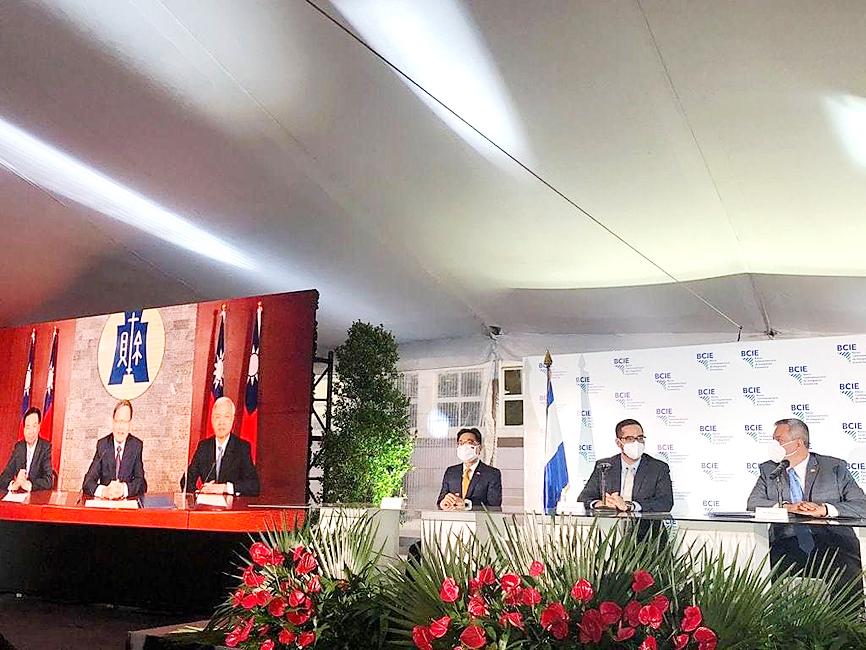The Central American Bank for Economic Integration (CABEI) is to open a regional office in Taiwan, the first in the nation by an international development financial institution, the Ministry of Finance said yesterday.
The agreement to establish the office was signed by Minister of Finance Su Jain-rong (蘇建榮) and CABEI executive president Dante Mossi during a virtual meeting, the ministry said.
The office, which is to open in June, would be the first of the development bank’s in Asia, Deputy Minister of Finance Juan Ching-hwa (阮清華) told a news conference in Taipei.

Photo courtesy of the Ministry of Foreign Affairs
CABEI is headquartered in Honduras and has regional offices in seven other Central American countries. The institution has 15 member states — including Taiwan, which holds an 11.09 percent stake in the bank, the highest among the seven non-regional members, the ministry said.
Taiwan joined CABEI in 1992 as “Republic of China (Taiwan).”
The opening is proof of Taiwan’s critical international presence, Juan said.
Founded in 1960, CABEI’s main objective is to “promote the economic integration and the balanced economic and social development of the Central American region,” the bank’s Web site said.
CABEI’s regional offices focus mainly on debt management and providing member states with financing for infrastructure projects, Juan said.
However, the Taipei office would mainly be tasked with establishing ties with Taiwan’s capital market, he said.
The office would help Taiwan boost its capital market and build closer links with Central America, he said.
Cooperation facilitated by the office would allow Taiwan to participate in the political and social development of the region, and raise its international visibility, Juan said.
Taiwan is the bank’s largest creditor in Asia, with a credit volume of US$2.65 billion, ahead of Japan, Hong Kong, Thailand and Singapore, he said.
Taiwan is temporarily represented by Su and central bank Deputy Governor Chen Nan-kuang (陳南光) in CABEI’s board of governors.
Taiwan would likely be granted a permanent seat in the future, the ministry said.

DAREDEVIL: Honnold said it had always been a dream of his to climb Taipei 101, while a Netflix producer said the skyscraper was ‘a real icon of this country’ US climber Alex Honnold yesterday took on Taiwan’s tallest building, becoming the first person to scale Taipei 101 without a rope, harness or safety net. Hundreds of spectators gathered at the base of the 101-story skyscraper to watch Honnold, 40, embark on his daredevil feat, which was also broadcast live on Netflix. Dressed in a red T-shirt and yellow custom-made climbing shoes, Honnold swiftly moved up the southeast face of the glass and steel building. At one point, he stepped onto a platform midway up to wave down at fans and onlookers who were taking photos. People watching from inside

MAKING WAVES: China’s maritime militia could become a nontraditional threat in war, clogging up shipping lanes to prevent US or Japanese intervention, a report said About 1,900 Chinese ships flying flags of convenience and fishing vessels that participated in China’s military exercises around Taiwan last month and in January last year have been listed for monitoring, Coast Guard Administration (CGA) Deputy Director-General Hsieh Ching-chin (謝慶欽) said yesterday. Following amendments to the Commercial Port Act (商港法) and the Law of Ships (船舶法) last month, the CGA can designate possible berthing areas or deny ports of call for vessels suspected of loitering around areas where undersea cables can be accessed, Oceans Affairs Council Minister Kuan Bi-ling (管碧玲) said. The list of suspected ships, originally 300, had risen to about

A Vietnamese migrant worker yesterday won NT$12 million (US$379,627) on a Lunar New Year scratch card in Kaohsiung as part of Taiwan Lottery Co’s (台灣彩券) “NT$12 Million Grand Fortune” (1200萬大吉利) game. The man was the first top-prize winner of the new game launched on Jan. 6 to mark the Lunar New Year. Three Vietnamese migrant workers visited a Taiwan Lottery shop on Xinyue Street in Kaohsiung’s Gangshan District (崗山), a store representative said. The player bought multiple tickets and, after winning nothing, held the final lottery ticket in one hand and rubbed the store’s statue of the Maitreya Buddha’s belly with the other,

Japan’s strategic alliance with the US would collapse if Tokyo were to turn away from a conflict in Taiwan, Japanese Prime Minister Sanae Takaichi said yesterday, but distanced herself from previous comments that suggested a possible military response in such an event. Takaichi expressed her latest views on a nationally broadcast TV program late on Monday, where an opposition party leader criticized her for igniting tensions with China with the earlier remarks. Ties between Japan and China have sunk to the worst level in years after Takaichi said in November that a hypothetical Chinese attack on Taiwan could bring about a Japanese